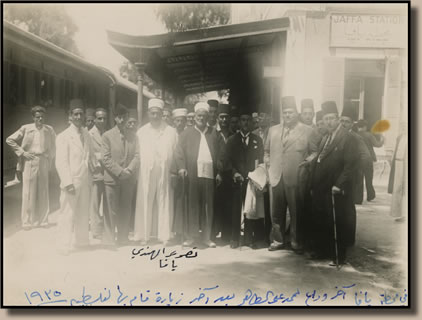YOU ARE NOT PALESTINIAN!
While residing in Egypt, Eltaher visited Palestine and the neighbouring Syrian hinterland quite regularly to see his mother, brothers and sisters, as well as to consult with various nationalist movements and intellectuals in those countries. It was during those years that the British government was busy preparing the country to settle Jewish immigrants it brought to Palestine from various parts of Europe and the Western world in general, but particularly those fleeing the pogroms and injustices from the Balkans, Russia and Central Europe pursuant to its undertaking in the Balfour Declaration. It is quite likely that Britain brought them to Palestine, among other things, to prevent them from immigrating to the United Kingdom15.
The native Palestinian Jewish community lived in peace with the other communities. That is until the European settlers brought by Britain arrived and proceeded to arm themselves with the stated objective of taking over the country.
This was going on of course without consulting with the Palestinians, or notifying them, or asking them “if you please”. As far as the Christian British politicians were concerned, Jews and Arabs were cousins and they would coexist without major problems. Of course things were not as simple as that, because the Jews Britain was bringing were mostly Eastern Europeans who had no ethnic connection to the peoples of the Eastern Mediterranean. Besides, the mostly Ashkenazi tradition they brought with them was already different from that of the local Palestinian Jewish community, whose members were rather Sephardic and Mizrahi (i.e. Oriental and Arab Jews) and Samaritan and much closer to the Islamic tradition. Furthermore, while Islam is heavily influenced by Judaism and Christianity, which preceded it, the three religions are actually pretty close from a religious perspective, though they also carry several important dissimilarities.
The British-administered Government of Palestine eventually decreed the “Palestinian Citizenship Law”, which was promulgated in order to naturalize the Jewish immigrants after it had offered them permanent residence in Palestine and thus provide them with a legal framework for their presence. As for the indigenous Palestinians, Jews, Christians and Muslims alike, they did not consider themselves to be in need of residence permits, citizenships, or naturalization since they were already at home in their own country. After all, they were all Ottoman subjects. Eventually the British issued Palestinian passports to the Jewish immigrants and to the indigenous Palestinians who applied for them, provided the latter were in the good books of the colonial power.
|
Jaffa Railway Station - Eltaher leaving Palestine
for the last time in 1935. |
During one of his visits to Palestine, Eltaher applied for a Palestinian passport, but his application was rejected, because he “was not considered to be Palestinian” by the Citizenship and Passport Office run by the British. He was advised though to apply for
Palestinian citizenship first to establish whether he was entitled to a passport, which would be issued if he was found eligible. As expected, the application was rejected though he had been born in Palestine, to Palestinian parents and grandparents who still lived in the country for generations.
The excuse was that the administration deemed him to be a non-resident in his own country, while Jewish immigrants born and raised in Poland, Germany, Russia, Rumania, etc., who had no organic relation to Palestine were granted residence and Palestinian passports by a third party, namely Britain! If religion were the only criterion linking the Jews to Palestine, then Christians and Muslims could perhaps make the same claim.
Eltaher told the story of his Palestinian passport in detail in his book “Nazarat Ashoura”. The book also contains several sections dealing with the various stratagems and laws, as well as the trickery and underhandedness, used pompously by the British colonial administration to refuse to allow him to reside with his family in his country of birth, at a time it was granting the right of abode to almost any European Jew who set foot on Palestinian soil.

